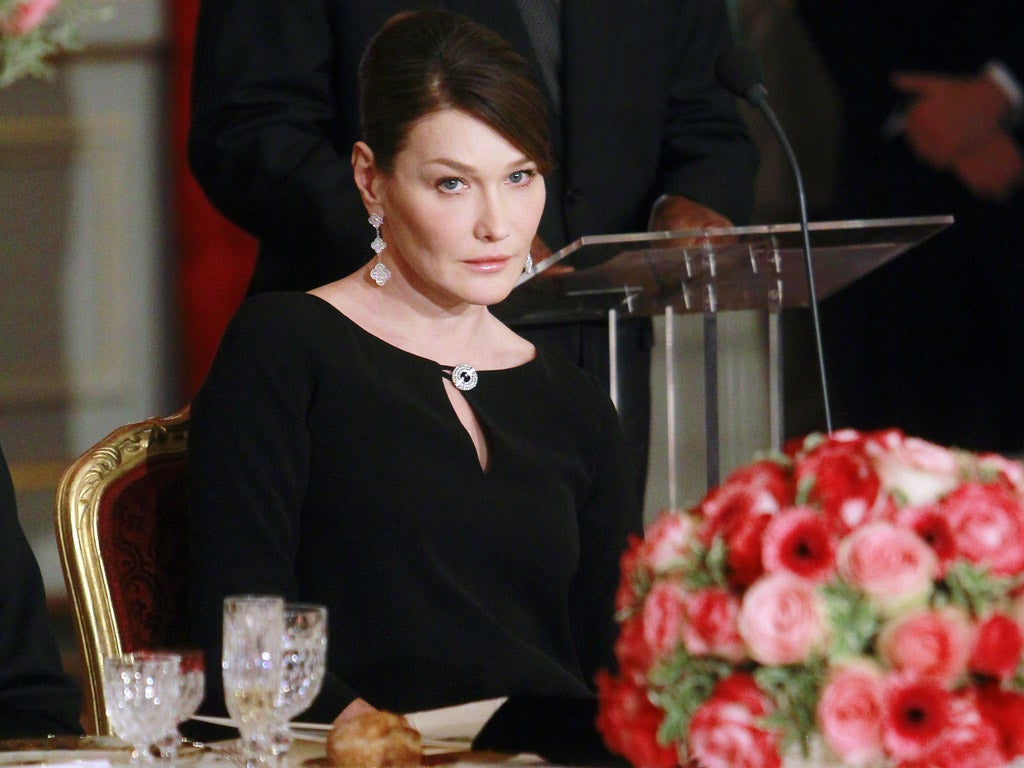Carla Bruni doesn't understand that being bourgeois and feminist are essentially the same thing
The glamorous singer and former French First Lady has a limited understanding of the bourgeoisie. Living in Islington, our Notebook writer should know

Your support helps us to tell the story
From reproductive rights to climate change to Big Tech, The Independent is on the ground when the story is developing. Whether it's investigating the financials of Elon Musk's pro-Trump PAC or producing our latest documentary, 'The A Word', which shines a light on the American women fighting for reproductive rights, we know how important it is to parse out the facts from the messaging.
At such a critical moment in US history, we need reporters on the ground. Your donation allows us to keep sending journalists to speak to both sides of the story.
The Independent is trusted by Americans across the entire political spectrum. And unlike many other quality news outlets, we choose not to lock Americans out of our reporting and analysis with paywalls. We believe quality journalism should be available to everyone, paid for by those who can afford it.
Your support makes all the difference.It’s not as if it has been Women’s Week, or anything, but we have certainly been under the spotlight.
First, it was Kate Winslet, telling us via the somewhat startling mouthpiece of HM The Queen, that being a mum was the most important job on the planet. And then, Carla Bruni – another woman who has acquired global fame and riches by doing quite a lot of things other than staying put and looking after the kids – agreeing that a woman’s place is in the home. As she put it (in an interview for French Vogue): “I am not at all an active feminist. On the contrary, I am a bourgeoise!”
What? Are not ALL feminists bourgeois? I don’t know about France, but here, feminist and bourgeois, you don’t get one without the other. We “active” feminists trot off to work in our Louboutins, campaigning for equal pay and more skirt in the board room. The unsung second verse is we employ other women to look after our children, clean our houses and do the ironing. And if that isn’t bourgeois, I don’t know what is.
Come to think of it, does anyone actually know any working-class feminists? The Suffragettes were as bourgeois as they come. They used their education and social position to gain maximum publicity for the cause. Their prototype, the writer, wit and beauty Caroline Norton, who had a scandalous affair with the then Prime Minister, Lord Melbourne, campaigned for the right of divorced women to have custody of their children, and paid for her daring with life-long social opprobrium, was the model of a bourgeois London lady.
Nearly 200 years on, I doubt whether you would find any bourgeois woman to admit she was not a feminist. It is the bourgeois woman who: a) has the confidence to think that she can have it all; b) the education/ambition to fight for equality, and afford the attendant childcare necessary, and; c) the lack of family capital which has necessitated her getting a job in the first place.
Aristocrats are not feminists. Neither are Tesco shelf-stackers (to use a convenient cliché of working class employment). Men can be feminists. Women, obviously. But both have to be paid-up members of the bourgeoisie. My credentials are so perfectly honed that not only do I live in Islington, where the taps run with balsamic vinegar, but I also have a habit of wafting around chez Millard listening to none other than – of course – Carla Bruni, whose music provides a delicious, utterly bourgeois backdrop to the quotidian goings-on.
Sending the kids out to work
Of course, as an “active feminist” I want my four children, girls and boys, to learn about what work actually entails. So I signed them up for Kids in Museums day at the British Museum. Their job was to stand in the Great Court, greeting visitors, handing out leaflets, and directing people to where they wanted to go. At the BM, this is usually either the loos, or what my youngest child (as befits an Islingtonian born and bred), calls the Risotto Stone.
“I enjoyed people who stopped and took leaflets,” said my 10-year-old daughter later, “but if they didn’t stop, it was embarrassing. And there really weren’t many families. It was mostly Chinese adults.” My 13-year-old son said: “Some people were not very polite. One man told me to ‘stop wasting his time’. And 90 minutes is too long to be standing around the entrance.” Rudeness? Fatigue? Frustration? Ah, the realities of everyday toil.
Twitter@Rosiemillard
Join our commenting forum
Join thought-provoking conversations, follow other Independent readers and see their replies
Comments